Left-Wing Conspiracy or Freedom of Expression: How the ‘No Kings’ Protests Challenge Trump’s Policies
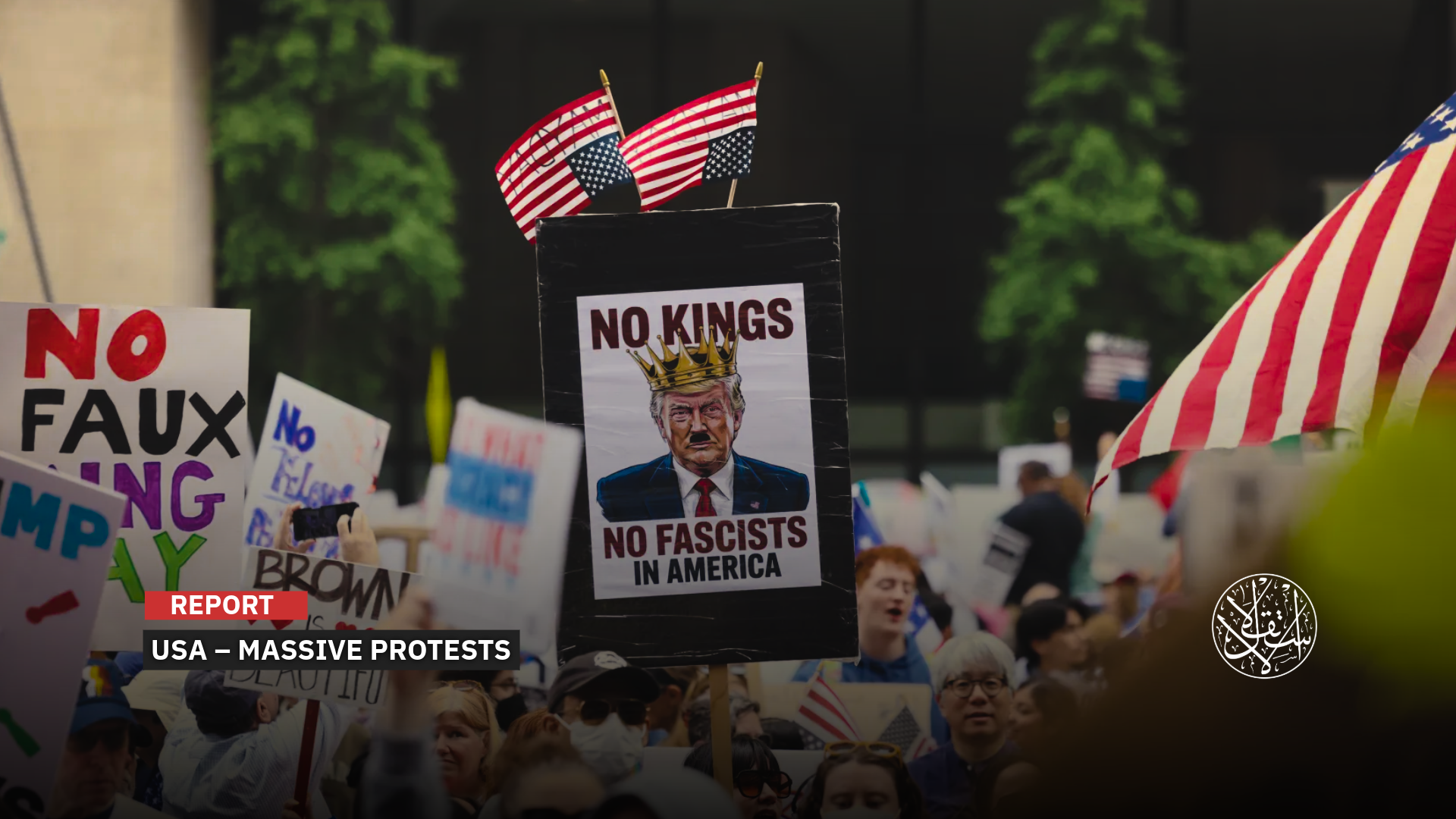
“Republican leaders have denounced the demonstration, referring to it as the hate America rally.”
The United States recently witnessed one of the largest waves of protests in its modern history, with about 7 million people participating in mass demonstrations under the slogan ‘No Kings’, following similar marches held last June that brought about 5 million demonstrators.
The protesters expressed their rejection of the excessive executive power during the Donald Trump administration, particularly following his decisions to shut down government institutions and expand the presence of federal forces within cities.
This was in addition to his aggressive policies on immigration, civil rights, and education, at a time when the American economy is experiencing a sharp slowdown and unprecedented societal divisions.
The organizers view these measures as a threat to the principle of separation of powers and open the door to an authoritarian presidency that exceeds its constitutional powers.
Meanwhile, human rights groups link Trump's policies to a global wave of rising populism and political extremism.
In contrast, the Trump administration and Republicans in Congress have downplayed the protests, describing them as anti-America rallies and blaming the left-wing Antifa movement for fueling them.
No Kings Protests
Reuters reported that No Kings marches spread to more than 2,700 locations across all 50 states on October 18, coinciding with the government shutdown entering its third week. Several world capitals also witnessed solidarity demonstrations.
Organizers described the protests as one of the largest popular mobilizations since the Black Lives Matter demonstrations in 2020, indicating that their goal was to counter what they described as Trump's attempts to concentrate power in his hands.
Protesters held up signs and chanted slogans such as: ‘No Trump, No fascism’, ‘Resist Tyranny’, ‘Our Country Is Too Small to Die Now’, ‘Freedom Without Fear’, and ‘No Kings Above the People’.
They also raised banners demanding the prosecution of Trump and his government officials, calling for the protection of immigrants, and demanding healthcare for all citizens.
Democrats have been calling on citizens to participate in these protests over the past few days.
Minnesota Lieutenant Governor Peggy Flanagan said in a video prior to the protest, “America doesn't make kings.”
More than 200 civil and human rights organizations participated in the demonstrations, including the American Civil Liberties Union (ACLU), Public Citizen, 50501, the Human Rights Campaign, Indivisible, and MoveOn.
According to Public Citizen, the battle today is not between parties, but between the idea of freedom and the concept of control, emphasizing that the protesters reject the fear that some seek to instill in society in order to silence dissent.
Ezra Levin, co-founder of Indivisible, said there is no greater threat to authoritarian regimes than the power of the nation's people.
In the face of the abuse of power by Trump and his allies, Deirdre Schifeling, ACLU's Chief Political and Advocacy Officer, said, “We will not be silenced.”
The National Immigrant Rights Network emphasized that the protests highlight what it described as systematic violations in deportation policies and raids of recent years, noting that thousands of families continue to suffer the psychological and social effects.
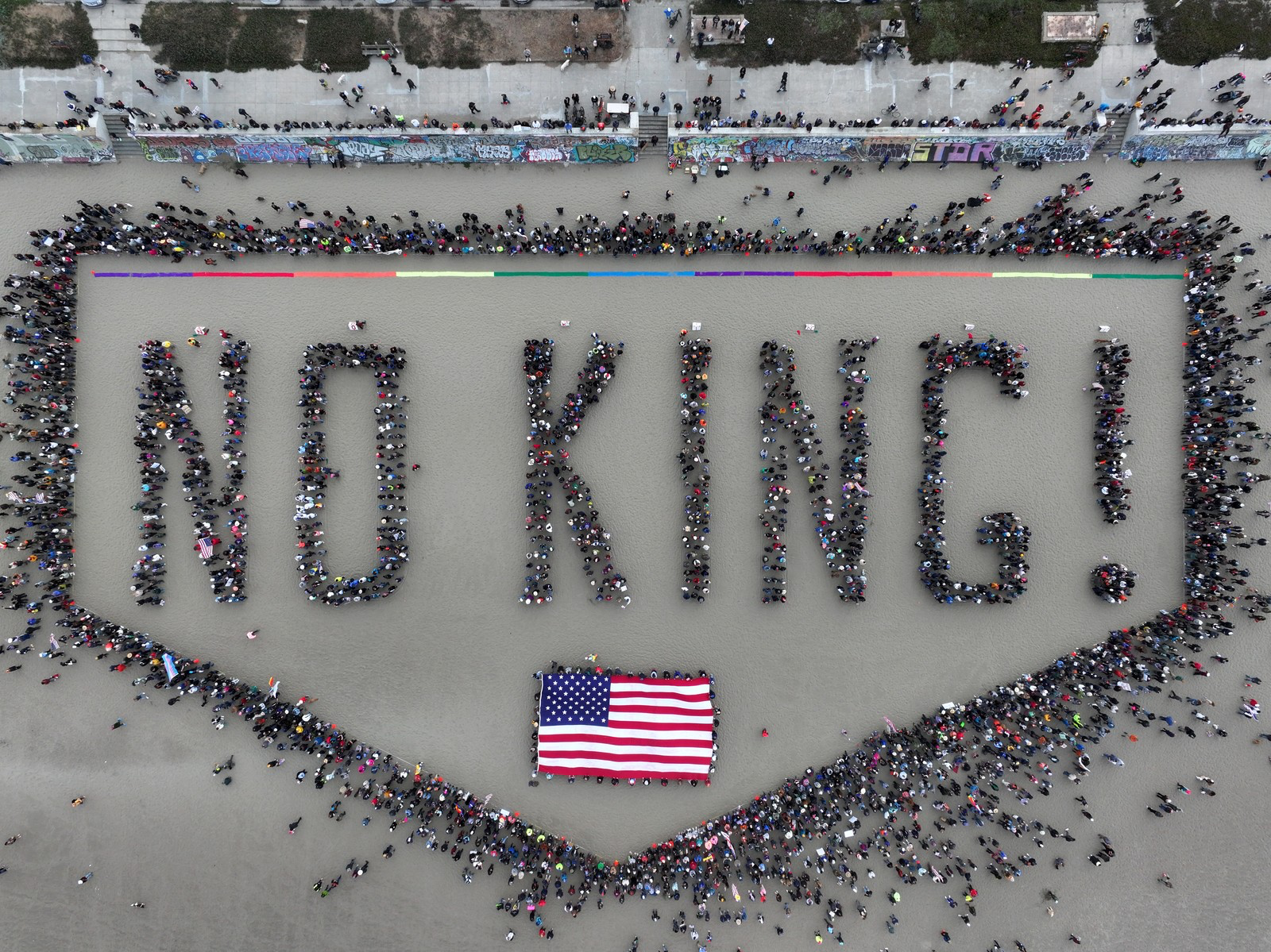
Dangerous Escalation
Meanwhile, Trump sparked widespread controversy after posting a wild AI-generated video on his platform, Truth Social, showing himself as a fighter pilot wearing a crown on his head, unloading sewage on No Kings protesters in New York's Times Square.
The video received widespread interaction on social media, with supporters viewing it as a symbolic display of the US president's power, while critics described it as a continuation of Trump's provocative use of social media for political and media purposes.
While the White House remained silent on the video, Democrats viewed it as a veiled threat and a dangerous escalation.
This video is the latest in a series of posts by the US President depicting him in mythical or royal roles, such as brave warrior or Pope, in an attempt to bolster his image as an exceptional leader.
Trump, who last June threatened to respond to the protesters with force, commented this week on Fox News, saying, “They're calling me a king. I'm not a king.”
But the image of him wearing a crown and royal garb in the video he recently posted suggests otherwise, especially since he previously hinted at a possible run for a third term, which is constitutionally improbable.
The No Kings movement first took to the streets on June 14, coinciding with Trump's 79th birthday celebration and the holding of a massive military parade to mark the 200th anniversary of the founding of the US Army.
The movement then mobilized about 5 million people into the streets of America, the largest protest since the Republican president's return to the White House.
The movement's organizers considered the custom of collectively celebrating presidential birthdays and organizing massive military parades to be characteristic of authoritarian regimes and unbecoming of a civilian democracy.
Since returning to power in January, Trump has disrupted the balance of American democracy, overstepping the authority of Congress and the states, and threatening his opponents with legal retaliation.
In recent months, the Republican president, whose rhetoric has become increasingly belligerent, has deployed military forces to Democratic strongholds, claiming the goal is to combat illegal immigration and crime, urging senior military officers to take action against the enemy within.
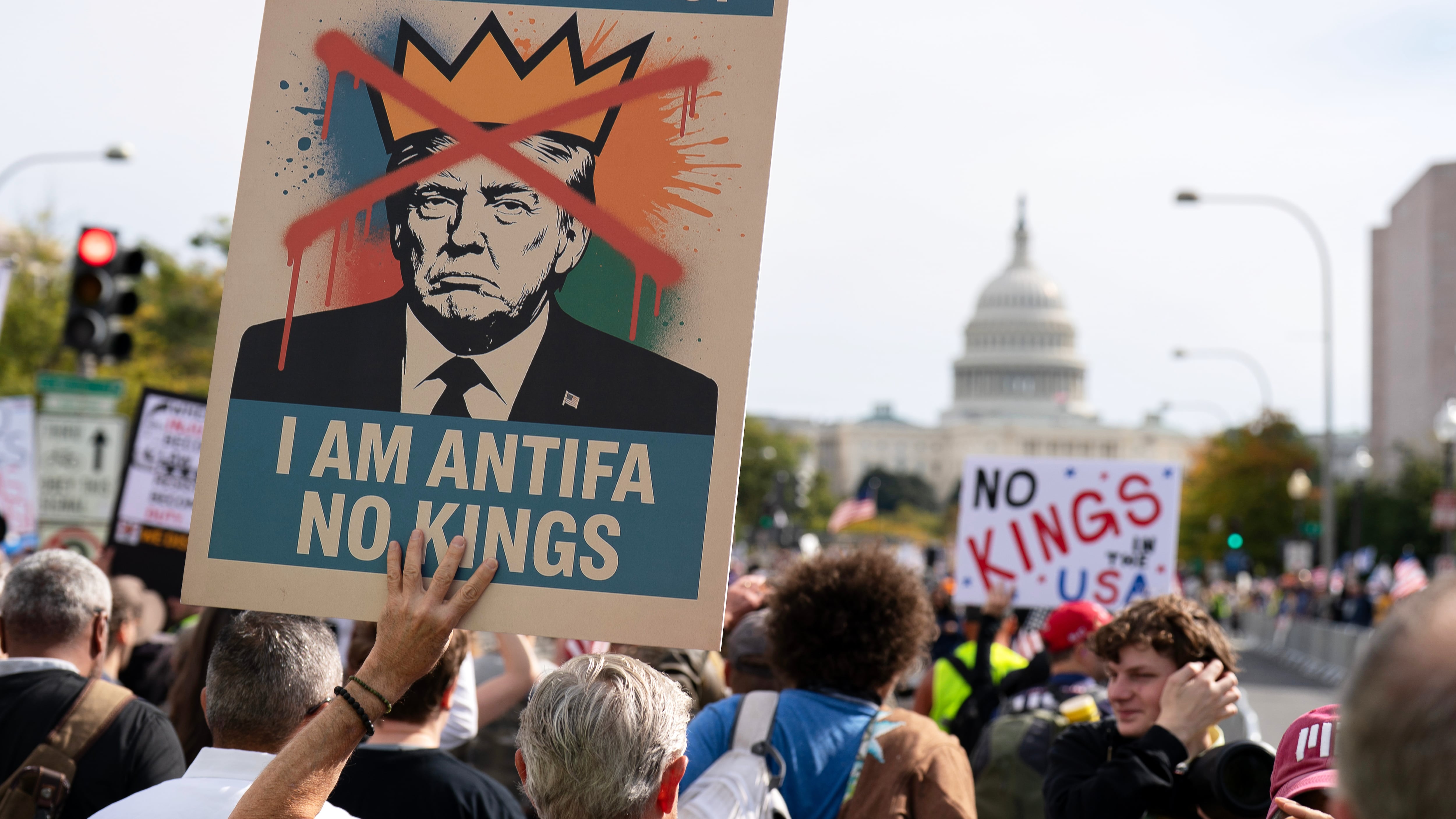
Hatred or Freedom?
President Trump's allies, on the other hand, describe the movement as part of a left-wing conspiracy aimed at destabilizing domestic politics and discrediting the previous administration.
Some Republican officials have even accused the anti-fascist movement Antifa of organizing the demonstrations.
House Republican Leader Mike Johnson described the planned rallies as a mobilization of hatred against America.
He asserted, “I bet you'll see supporters of Hamas and Antifa, which the US President recently designated a terrorist organization.”
A few days later, Treasury Secretary Scott Bessent said during an appearance on Fox Business: “As you know, no kings means no payrolls. No payrolls mean no government.”
Texas Governor Greg Abbott announced he would deploy the National Guard to Austin to ensure public safety, a decision that was met with sharp criticism from human rights organizations.
Texas House Democratic Caucus Chairman Gene Wu responded by saying, “Sending armed soldiers to suppress peaceful protests is what kings and dictators do. Greg Abbott just proved he's one of them.”
Minnesota Rep. Tom Emmer accused Democrats of surrendering to the terrorist wing of their party.
In turn, Democratic Sen. Chuck Schumer called for restraint and protecting citizens' right to protest, emphasizing that resorting to violence or silencing voices is not part of the American republic's values.
He posted photos on X of himself with protesters in New York, adding that “we won’t allow Trump to keep eroding our democracy.”
Sen. Bernie Sanders stated that the protests reflect the anger of a nation that fears its president is becoming an uncrowned king.
Maryland Democratic Rep. Glenn Ivey told AFP: “The No Kings campaign will play a crucial role in America's future, so I understand why Republicans are concerned.”
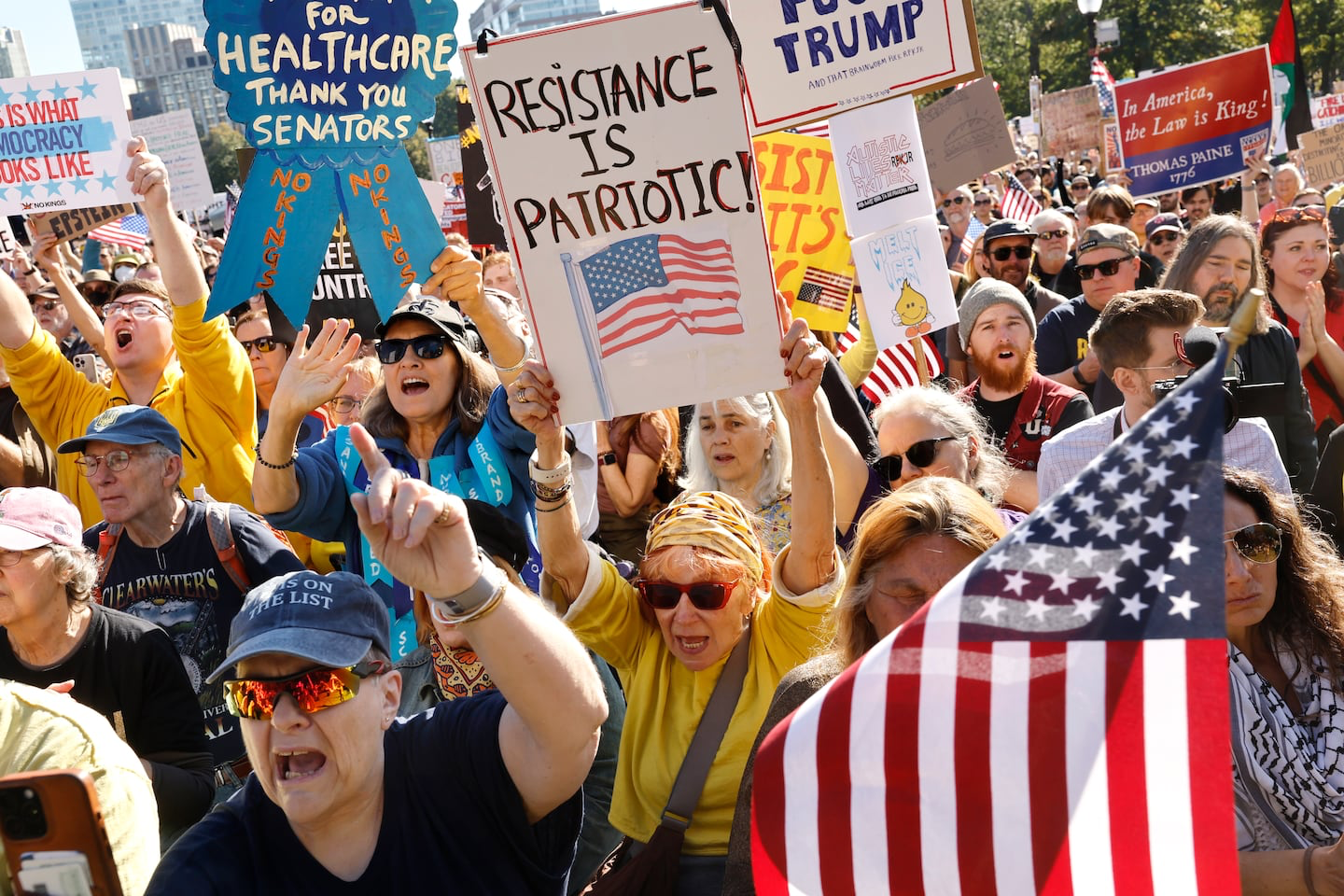
Democracy Under Threat
Historically, protests have been an integral part of American political life, from the civil rights marches of the 1960s, to the Iraq War demonstrations, and the Occupy Wall Street movement.
But observers believe that what distinguishes the No Kings movement is its explicit constitutional character, as it is based on the philosophy of the Founding Fathers, who rejected the idea of absolute power.
In the 1776 Declaration of Independence, the phrase No Kings Anymore was used as a symbol of freedom from tyranny. Royal, the same phrase protesters are raising today in the face of what they see as contemporary political tyranny.
Historians say this return to founding symbols is no coincidence, but rather a reflection of a growing crisis of confidence in the political system.
Polls show that more than 62% of Americans believe democracy is under threat, according to a Gallup poll conducted in October 2024.
In addition to the human rights justifications, the crisis intersects with a government shutdown, economic decline, and a financial crisis that are impacting millions of Americans.
Data from the Department of Labor shows that poverty rates rose to 13.5% over the past year, while food and housing prices have risen by about 22% since 2022.
Experts believe that these conditions have created fertile ground for protest, especially in industrial cities and southern states experiencing widening social gaps, making calls to resist political and economic tyranny resonate widely among the middle and working classes.
Researchers say that the No Kings protests may represent a watershed moment in American democratic consciousness, both in terms of redefining the limits of power and restoring the values of political participation.
However, they warn that the continued sharp polarization between Trump supporters and opponents could lead to renewed escalation in the streets, especially as the upcoming midterm elections approach and the accompanying tensions over the integrity of electoral institutions.
A poll issued by the Pew Research Center revealed that 71% of Americans believe that political discourse in the country has become more aggressive than ever.
It noted that 58% of Americans express their fear that the country will slide into organized political violence if calming measures are not taken.
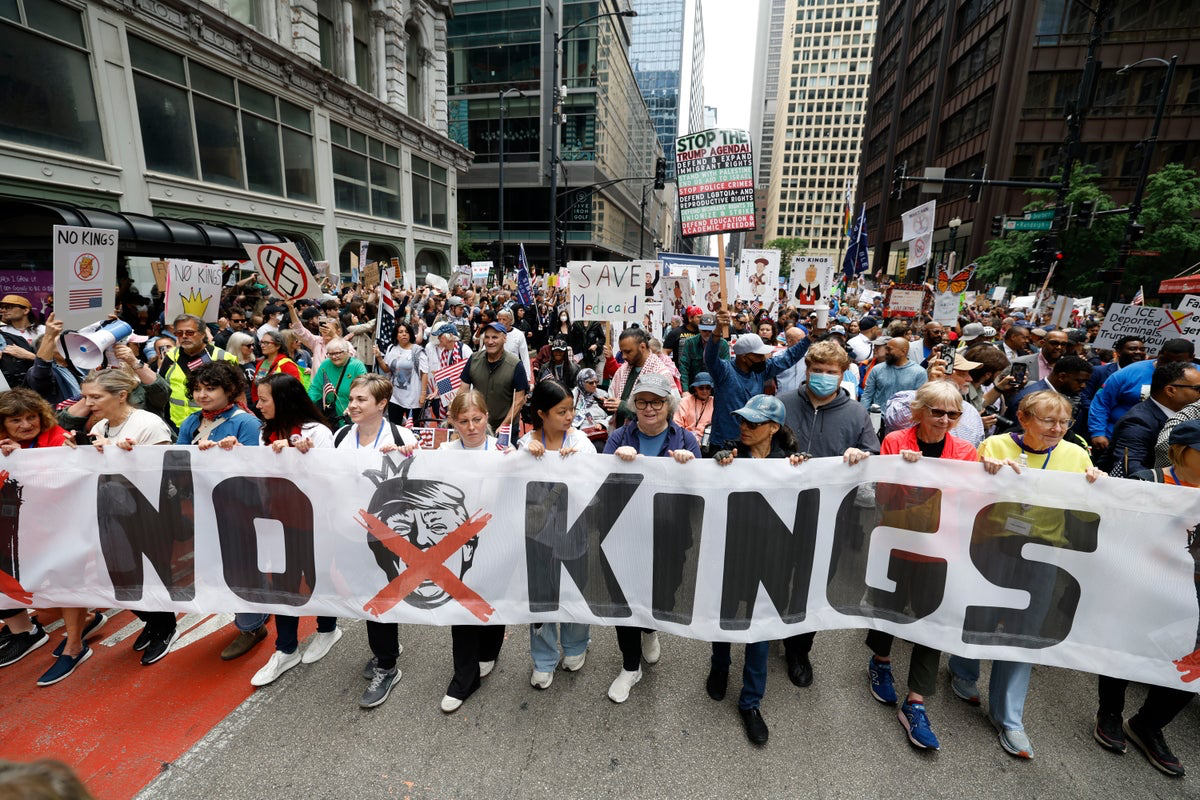
Ultimately, the No Kings movement is reviving a central question in the American experience that has come to the fore: Can democracy withstand the tendency of the absolute individual in crises?
Protesters from the streets across the U.S. chant that no one is above the constitution and that the presidency is not a throne.
Observers are betting that state institutions will remain capable of absorbing shocks and maintaining their historic balance between power and freedom.










